'The Talk' Has Male Hosts for the First Time—and They're Ready to Get Vulnerable
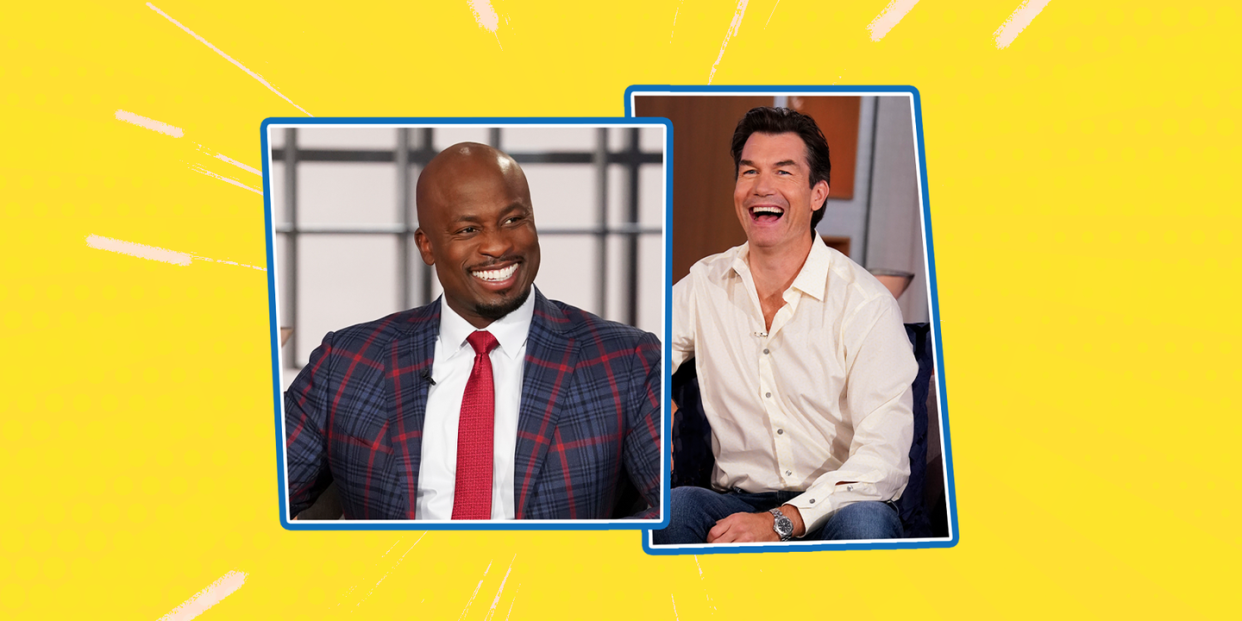
- Oops!Something went wrong.Please try again later.
- Oops!Something went wrong.Please try again later.
- Oops!Something went wrong.Please try again later.
- Oops!Something went wrong.Please try again later.
- Oops!Something went wrong.Please try again later.
- Oops!Something went wrong.Please try again later.
It didn’t make sense at first. Seeing two guys—let alone an actor and former athlete—join a daytime talk show starring women felt like a personal attack. How dare Jerry O’Connell and Akbar Gbajabiamila invade this space. They better not bring their fantasy football discussions here!
But there they are, every afternoon sitting in their beige chairs and making me smile. O’Connell and Gbajabiamila have joined CBS’ long-running The Talk as the show’s first male co-hosts in its history. O’Connell joined over the summer, and since September the two men have appeared together alongside comedian Sheryl Underwood and Broadway star Amanda Kloots. Earlier this month, journalist Natalie Morales came on as the final co-host of the season.
Bringing men into the fold is an unexpected resolution to The Talk’s controversial year. After 11 years as CBS’ congenial alternative to The View, the show’s pleasantries faded when original co-host Sharon Osbourne exited in March following a heated discussion about race on the show. Over the next few months, fellow co-hosts journalist Elaine Welteroth and Dancing with the Stars judge Carrie Ann Inaba bowed out. Neither cited Osbourne as the reason for their departures.
Given last year’s co-host exodus, the replacements were always going to be newsworthy. Still, it came as a surprise to see CBS opt for two men (men!) in a space dominated by women. Sure, there have always been a few guys floating around celebrity daytime interview shows: Phil Donahue, Regis Philbin, the doctors (Phil and Oz) and The Doctors, Michael Strahan, Ryan Seacrest and even Anderson Cooper and RuPaul for brief moments. However, most popular daytime talk shows are woman-centric in part because women aren’t afforded space elsewhere on TV.
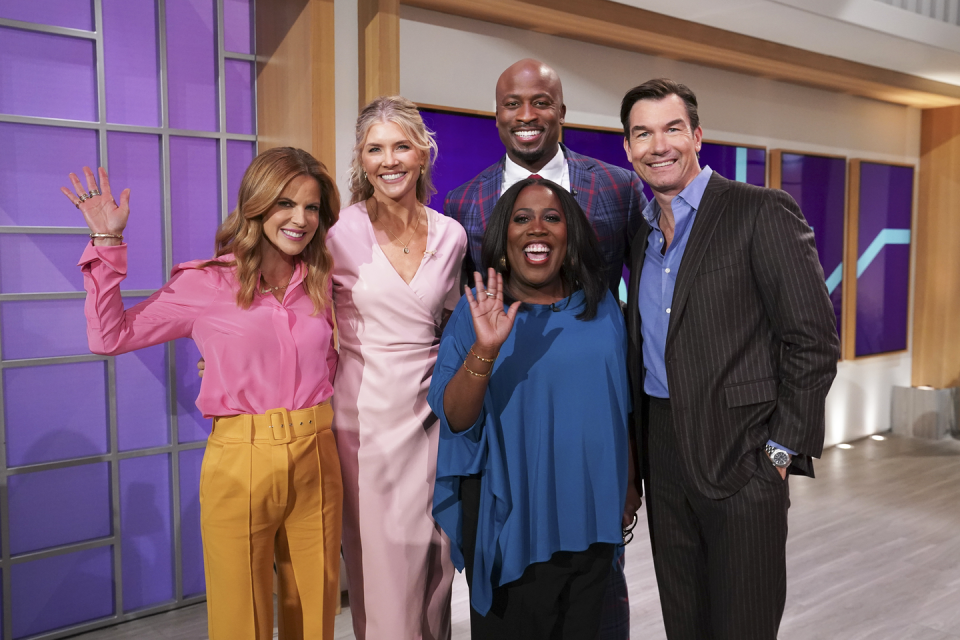
Just look to the Emmys for recent proof. Since its inception in 2015, the Daytime Emmy for Outstanding Entertainment Talk Show has always gone to a show with an all-female panel or a stalwart woman at the helm of a long-running program (as in the case of Kelly Ripa on Live!). The Talk even won in 2017. Daytime is where women shine in the talk TV world.
Right now, this includes such stars as Ellen DeGeneres, the ladies of The View and The Real, Wendy Williams, Tamron Hall, Drew Barrymore, Kelly Clarkson and Rachael Ray. And thank God a.k.a Jada Pinkett Smith on Facebook’s Red Table Talk for always bringing the family drama.
At a time when men are encouraged to pass the mic, it might seem odd to spotlight two dudes. However, as O’Connell and Gbajabiamila tell Men’s Health, the show isn’t just an opportunity to bring men into the conversation. It’s also a personal achievement.
O’Connell has spent years toiling as a fill-in daytime host on shows like Live with Kelly! and The Wendy Williams Show, where he’s shined in a way that his acting career hasn’t always afforded. He says he’s still associated with child stardom after appearing in the 1986 film Stand By Me.
As for Gbajabiamila, who also co-hosts American Ninja Warrior, he wanted to prove he’s more than just another NFL athlete trying to make it in broadcast. It’s a feat he’s made it this far without the leg-up of a famed football career like Strahan or Terry Bradshaw.
This is what they hope to bring to The Talk: male vulnerability. Now that’s something to talk about.
You both hopped into this interview speaking very passionately about working out. Is there a mental health importance for you?
O’Connell: I'm an older guy. I'm 47, and I think my happiness is directly linked to fighting that.
Fighting what?
O’Connell: Fighting age. I'm staying healthy. Not only feeling good, but looking good.
Gbajabiamila: What I tended to do during the pandemic was I started to look at different workouts that people are doing on social media, especially on Instagram. What ended up happening is that as I go to my Discovery page, what I started to see was all of these guys and women who are just jacked-up and the most fit. I started to feel less about myself. I don't look as good. My abs—I wouldn't want to go to the beach and take off my shirt. It was really starting to play a cycle. Prior to then, I didn’t really have that relationship.
You both have image-based careers. So, it's fascinating to me to hear that social media for you is where you're more—correct if I'm wrong—insecure. Aware, I guess, is a better word.
Gbajabiamila: No, go ahead. Say it. I think insecure has become quite the thing. It's crazy. In 2018, I ran the American Ninja Warrior course. I was probably in the best shape of my life since playing in the NFL. I had really worked hard. Look, shirt’s coming off to run this course. I need to make sure I look tight. But what ensued afterwards was the stress of trying to maintain that look.
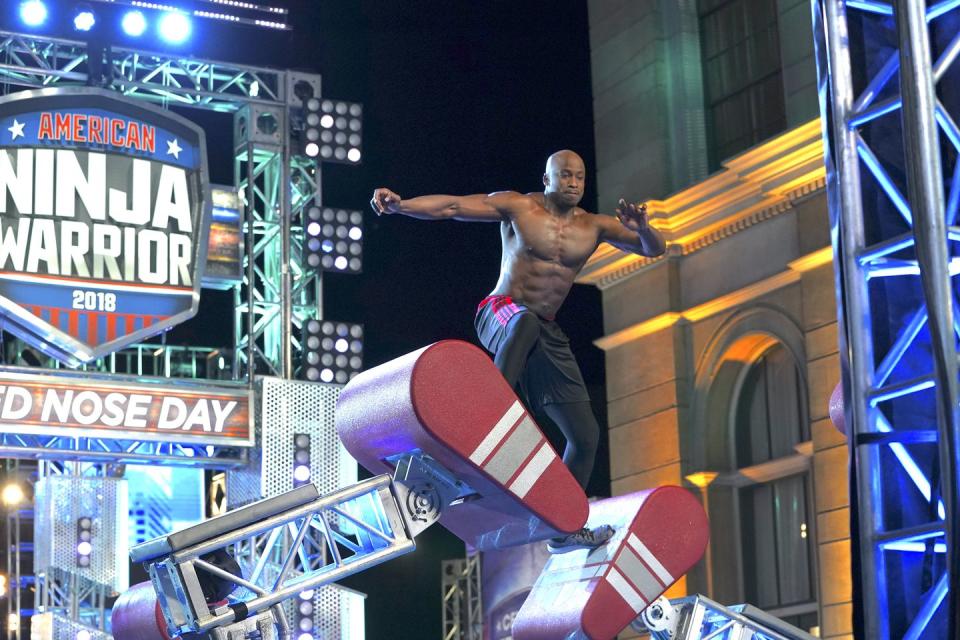
Did you feel this awareness of caring about your fitness when you were younger?
Gbajabiamila: Yeah, but for different reasons. I wanted to be the best in sports. I wanted to be the most dominant person. I was in love and attracted to the greatness of Muhammad Ali, Michael Jordan, Magic Johnson [and] Rocky Balboa.
O’Connell: I have a question for Akbar. When you're in a locker room with other NFL athletes, is there a [sense of] I'm working out to make sure I look as good as some of these other people in the locker room?
Gbajabiamila: In sports, when you run a bunch of Alpha men, and particularly [in] the NFL you run a bunch of Alpha men, they could care less about what your body looks like aesthetically. That's just like an oh by the way. Can you produce? It's based off of production. If you've got the sloppiest body, but you the coldest dude on the team and you're the reason why the team is winning, you get all the respect and the love.
O’Connell: I always had to stay a little bit in shape because I usually worked on shitty TV shows where you'd be doing a scene with somebody and they go, "Hey, how do you feel about playing the scene without a shirt?" If you do a cable romantic movie, they typically say, "I know this scene is taking place in a church, but how do you feel about going shirtless for this?"
Gbajabiamila: That's stressful, dog.
O’Connell: I was doing this scene in a front yard. I was just a guest star on the show, and they came up to me and they said, "How do you feel about taking your shirt off for this thing?" And I was like, “Oh no, no, no. Please. I'm just not ready.” I wasn't expecting that. I just wasn't ready for this, and they were like, "[It’d] really help us out if you [were] just in your front yard, and you didn’t have a shirt on.” I saw that scene, and it looks terrible. I didn't look good. That's not who I want to portray as an actor, even if it is a crappy show, you know.
I swore I would be ready after that. Obviously, you can't be 1,000 percent ready at all times, but I could be a couple weeks away from being okay with taking my shirt off at all times. That's how I really try to live my life.
Gbajabiamila: If you go through and comb through my social media, I think since I made that run in 2018 on Ninja Warrior when I actually did the course, I don't think I've taken my shirt off for Instagram or for any of the other social media platforms.
I don't want my body to be compared to that until I'm ready. But can you think about how vain that is? How shallow that is?
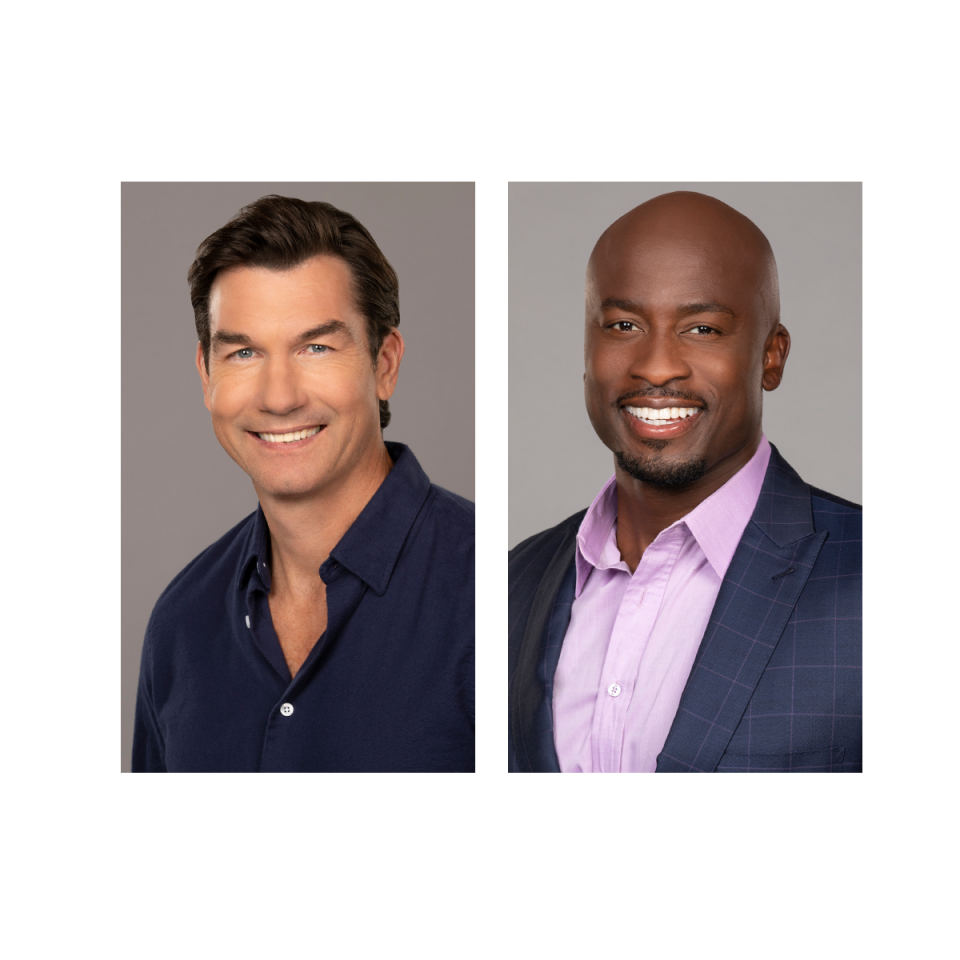
Jerry, I wanted to ask you more about Stand By Me. You were known more as a chubby kid.
O’Connell: I like husky. Husky is a good word.
Is that something you’re still associated with?
O’Connell: It shaped who I am as a person. It's how I interact with people—absorb that however you want to. It's my personality. That shaped how I deal with people. When I interact with anyone in my life, I am that kid. I'm that husky kid. So it still does affect me.
Can you explain what drew you to want to be full-time co-hosts of The Talk?
Gbajabiamila: The fact that it was something I've always wanted to [do], going back to the days when I used to watch Oprah Winfrey. To see a person [and] representation—to have a Black woman on television and the way she carried her show, [that’s] obviously history. Everyone's probably said the same thing, but I grew up in that era. That's what I watched, and it was right when I came home from school.
O’Connell: Anyone else on your high school football team watching Oprah, or were you the only one?
Gbajabiamila: Not only did I watch Oprah, I watched General Hospital. I watched All My Children. I watched Ryan’s Hope. I watched some of [the] old school soap operas. Feel free to edit that part out.
O’Connell: No, that's the title!
Gbajabiamila: If my boys hear that I grew up watching all of this, oh I'm gonna get clowned.
I'm glad you brought that up because daytime talk shows historically have always been kind of viewed as a female space.
Gbajabiamila: I've always recognized that there was a gender thing to it where there were all women, but I just wanted to be a part of a discussion. Because really, truly, a discussion doesn't have a gender.
O’Connell: I cut my teeth in the daytime world with the best who's ever done it: Kelly Ripa. I was filling in at the time, god rest his soul, for Regis Philbin—who was one of the OG daytime people. He was a guy, you know. Again, the best who's ever done it. So I never really thought about my gender being weird because I came in from there.
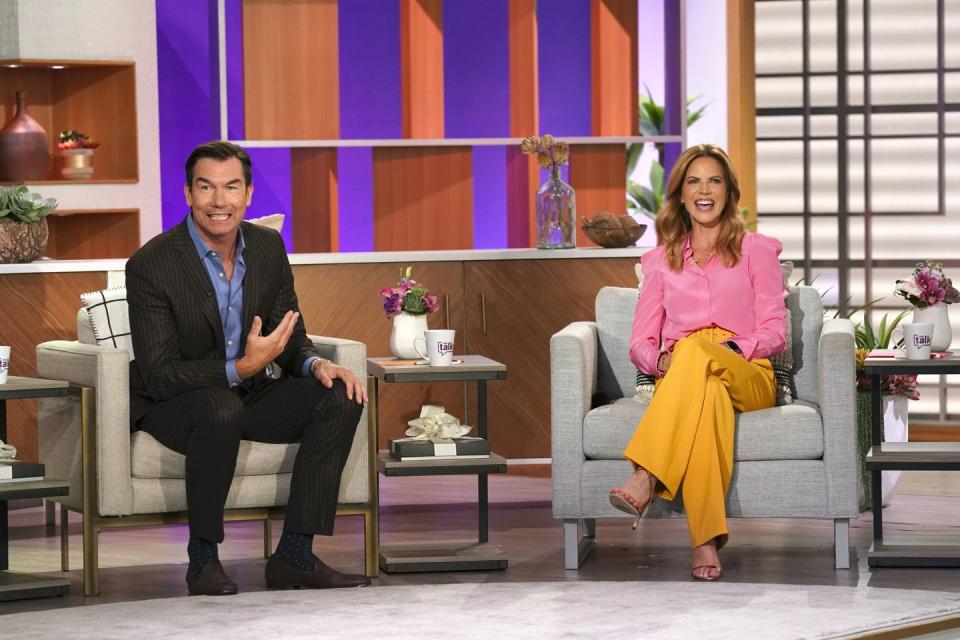
Last season became its own talking point with Sharon Osbourne’s discussions. I don't really want to get too far into that, but I'm curious for you both coming in what conversations you did have about how to move forward.
Gbajabiamila: Forgiveness is giving up the hope that the past could be any different. I think what happened happened. Moving forward, oftentimes when people are traumatized or when people have been offended, they go back and they loop in their head what happened in the past. They loop it over and over into the future [and] into the present. It takes away the ability to grow. So, I think in this situation with this new group — look I'm not gonna sit here and say I don't know what happened in the past. I don't know all the details as I wasn't there, but I think it’s important to move forward in understanding what forgiveness looks like.
O’Connell: I met my wife when she was going through a divorce and was, like, traumatized from that.
The sadness would come in waves, and anytime it would come, I'd be like, “Whoa, listen, that's none of my business. I'm just the new guy here. We're just dating. I don't need to hear all that. Why the sad face? Let's get out of here. Let's go out.” I really attribute my timing with my wife for how I married infinitely above my hotness level. And I attribute how I got the job on The Talk to also coming in March of last year, right after all their turmoil. Their trauma, [and] their divorce went down. I came in, and literally everyone was sort of like my wife after a divorce…I swear to you, it’s the same thing. My wife was dying to get out of the past and have fun. I’ve done it twice now.
How do you approach a show where you’re supposed to be giving your opinions? Not only the history of The Talk, but also this idea that it can be very hard to share something that’s not going to be well received.
Gbajabiamila: I’d be lying to you, and I wouldn't be authentically myself if I didn't say that [is] one of the concerns that I had coming into this new space on daytime television.
I have a shirt that I’ve made, and I’ll end on this, that says “Conversation over confrontation.” I think that should be the strong message.
O’Connell: I'm not worried about my inner feelings coming out and getting me in trouble. But if I do say something that upsets people, I'm going to apologize.
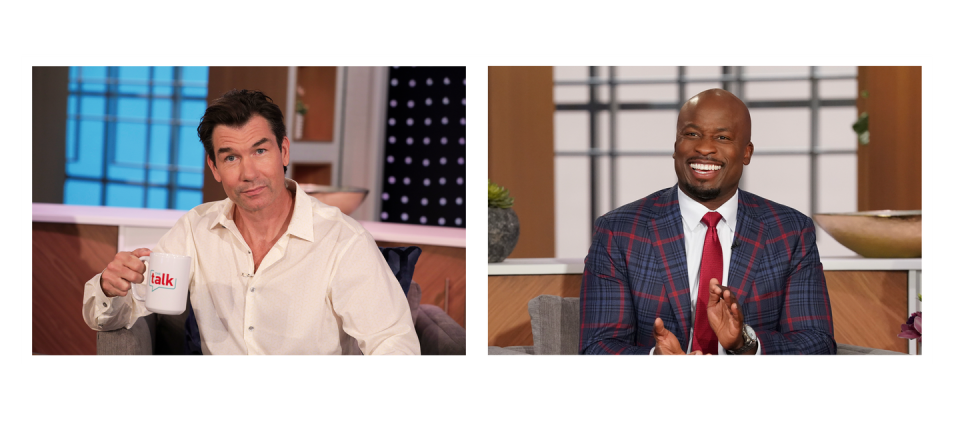
I’m curious what you found to be the hardest career pivots.
Gbajabiamila: The hardest pivot for me was pivoting from the NFL into television. For a couple of reasons, I wasn't the biggest name football player in the country. I was a guy who played in the NFL, but my stats aren't impressive. I wasn't All-Pro, playoff [or] Super Bowl. None of that.
That was the hardest pivot because you go through this depression thinking, “Man, like I have no other value outside of athleticism, and my athleticism has now betrayed me because I'm getting older.”
O’Connell: For me, it was just not being known as the fat kid from Stand By Me anymore. When I was younger—like in my 20s—if someone on the street or at a bar went, “Hey, fat kid from Stand By Me,” it used to really anger me. I'm very proud of the film, and I've sort of resigned. You can't live your life angry all the time, so I'm just like, wow, that's gonna be what people yell at me.
What do you hope you would be better known for now?
O’Connell: I don't care. As a good dad. I don't care about what I'm known as. I hope my girls say, “My dad was the best.” That's all.
I don't give a shit about work. We have fun going to The Talk, and it really is fun to go there and be like, whoa, you know, the Britney [Spears] ruling came in yesterday. I can't believe we're all going to talk about it. I can't wait to hear what Akbar is going to say. But I'm going to Hall & Oates tonight with my wife. I'm all about the party.
This interview has been edited and condensed for length and clarity.
You Might Also Like

